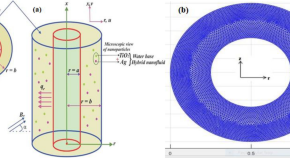The use of neural computational analysis for drug delivery applications results in hybrid nanofluid flow between the uniform gap of two concentric tubes
Authors (first, second and last of 6)

Collection
Artificial Intelligence (AI) has shown enormous potential in changing healthcare by enhancing diagnosis, treatment, and preventative measures. AI systems can swiftly and reliably analyse large volumes of data, enabling more precise and prompt diagnoses. Machine learning algorithms, for example, may analyse medical images such as X-rays, CT scans, and MRIs to find anomalies and assist clinicians in making more accurate diagnoses. AI may also analyse patient data including medical history, vital signs, and test findings to forecast and prevent illnesses before they emerge. AI has the ability to improve therapy and medication development as well. AI can assist healthcare practitioners tailor treatment strategies for individual patients by analysing patient data, enhancing treatment efficacy and lowering adverse effects. AI may also help with medication research by analysing massive volumes of data to find possible targets for novel medicines, therefore speeding up the drug development process.
Biological interventions entail the use of biotechnology in the development of innovative cures and medications. These interventions have the potential to address illnesses at the molecular level, resulting in more precise and effective therapies. Gene therapy, for example, involves inserting genes into a patient's cells to fix or replace defective genes, perhaps offering treatment for hereditary illnesses. Cell-based treatments, including stem cell therapy, use cells to restore damaged tissues or organs. Tissue engineering is creating tissues or organs in the lab and transplanting them into patients, potentially solving the organ scarcity problem.
Healthcare providers can enhance patient outcomes, cut costs, and encourage sustainability in medical practice by combining AI and biological interventions. AI can help identify patients who are most likely to contract particular diseases and create individualized treatment plans utilizing biological interventions. This individualized method can cut down on pointless procedures and enhance patient outcomes. AI can also aid in the optimization of clinical trials for novel therapies, cutting down on the time and expense involved in drug development. Combining these two factors may result in more affordable and effective healthcare, supporting the sustainability of the medical and environmental profession. In this Topical Collection, original research articles and reviews are welcome. Research areas may include (but are not limited to) all AI application studies in the biological fields.Dr. Fuad Ameen, Associate Professor, King Saud University, Saudi Arabia. He had served as a researcher in different places in the field of biotechnology and applied microbiology. He has collected and studied microbial strains from arid and marine ecosystems indicating their ability to biodegrade the most common pollutants, and his program of research on these organisms has taken him to many places and to examples of every major type of terrestrial and marine bio-ecosystems.
Dr. Abeer A. Al-Masri, Associate Professor, King Saud University, Saudi Arabia. She is a Qualified researcher as the Head of the Cardiovascular Research Group (RGP-VPP-016) at King Saud University (KSU). She is a scientific editor and reviewer in numerous scientific journals and the member of many scientific societies and committees. Organized and participated in various conferences and workshops. She is a motivated, proactive, and highly skilled project manager with outstanding team leadership abilities to meet targets consistently.

